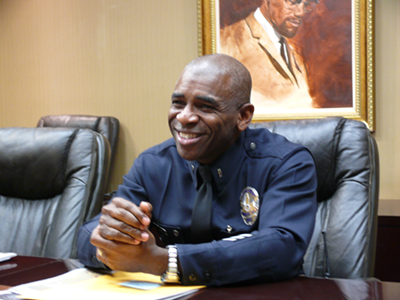
Captain Gerald A. Woodyard
–Photo Credit: Brian Carter for Sentinel Photo
As a captain, he is making sure that the community stays safe by building bridges between the residents and LAPD.
Captain Gerald A. Woodyard is the Commanding Officer of the Southwest Patrol Division (the Southwest station is named in honor of another LAPD stalwart, Homer F. Broome). He has been a police officer for almost 171/2 years and is here for the community. He is married and a father of three children. He’s active in his church and the community.
“I’m in charge of reducing crime,” said Woodyard. “What we’re looking for in 2012 is looking for creative ways [to engage the community].
“Because, ultimately, it’s the community’s responsibility as well as our responsibility in make this place safe for all of us.”
Woodyard was born in Mobile, Alabama, but was raised in Sacramento, CA. He was the youngest of three kids born into a single parent family. After getting a football scholarship, which took him to Long Beach State University, he received his Bachelors of Science Degree in Criminal Justice with emphasis on Law Enforcement.
Starting his career with the Los Angeles Police Department (LAPD) as a probationary police officer at the Southwest division in 1995, he completed his probation period at Southwest division and worked at the Northeast and Southeast divisions respectively. Woodyard even worked in the Training Division as a physical and self-defense instructor.
In 2002, he was promoted to sergeant and assigned to the Harbor Division, Operations-South Bureau, Counter-Terrorism and Criminal Intelligence Bureau. In 2008, Woodyard was promoted to Lieutenant and came back to Southeast Division as watch commander. In 2011, he was promoted to Lieutenant II as Officer-In-Charge of Community Relations Section, where he was responsible for identifying and fostering relationships with key stakeholders on behalf of the Chief of Police.
In January 2010, Woodyard was promoted to his current rank (captain) as Commanding Officer of Southwest Patrol Division. In this position, he leads over 400 sworn and civilian personnel. He has a personal stake in this community and believes in building trust between the community and police department.
“It takes time to build relationships, it’s not overnight,” said Woodyard. “If you really care about it, you’re going to have to put the time in.”
Woodyard particularly feels strong about addressing gang violence and increasing community safety.
“I know this community wants the same thing that any other community wants,” said Woodyard. “They want their kids to be able to go to school without the fear, incident or crime.
“We want the same thing here. We’re always looking at creative ways of dealing with that issue.”
He stressed the importance of LAPD going beyond the job in finding solutions to problems in the community. Woodyard said it’s more than just arresting, but understanding and helping the community are just as important.
“We’re real successful at making arrests, you can always do that but I think if we can prevent it from occurring in the first place, I think down the line, you’ll see [positive results].
He added that many police officers are from the community and have a personal stake in seeing it flourish and prosper.
“In the southwest division, there are a tremendous amount of officers that actually grew up in this area,” said Woodyard.
“It’s always nice to see someone [in LAPD] that looks like you, speaks the language, that understands where you are coming from.
“Those are the officers that really, in my opinion, can relate. And, honestly, if you have to make that arrest, you got to make the arrest-but you’re not going to take it personal.
“I can tell you, from the southwest standpoint, a lot of these officers care.”
Racism in LAPD is a rare thing truly heard or addressed by most in the community. Woodyard offered some reasons on why this issue is seldom heard.
“‘[Are] there issues?’-Probably not out there right in your face because [LAPD] is made up of so many diversities,” said Woodyard.
“There’s always going to be something that could pop up but LAPD does a really good job with [their] policy and bureau tolerance towards any type of racial bias.
“We’re always mindful of it-you got to have it on the forefront. The reality is, it has gotten so much better.
“Often times, as an African American officer, you’re either construed as an ‘uncle tom’ [or] ‘sellout’,” said Woodyard. The reality is… I knew I wanted to come back to this community to have an impact-I wanted to be a solution.
Last year, Woodyard stated that the LAPD’s aim was to reduce crime in the area by 5 percent; it exceeded its goal. This year, the goal is the same and so is the dedication he has to making sure it is a reality.
“If they [the community] don’t have the perception that crime is really going down and it’s not safe to go to that mall… or go to [a local restaurant] and eat, then I’m not doing my job,” said Woodyard.
Woodyard is a committed police officer to the community and to the job. He intends on doing his job to the best of his ability.
“Everyone has a job to do.”
Woodyard follows a tradition of African Americans who paved the way to make the LAPD what it is today in terms of diversity. They included, but are definitely not limited to, Officer Oscar Joel Bryant, Kenny Garner, Jess Brewer, Earl Broady Sr., Thomas Bradley and Bernard Parks Sr.






